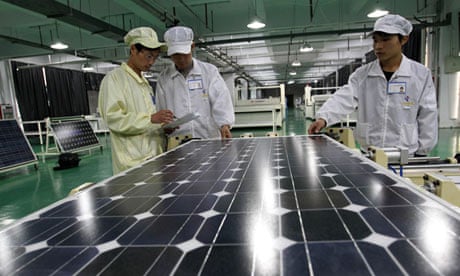The European commission is imposing anti-dumping tariffs on Chinese solar panels, in a move that could spark tit-for-tat retaliation from the world's second largest economy.
The commission, the EU's executive arm, accused China of undercutting European rivals by selling panels below-cost and threatening 25,000 jobs in the European solar industry.
"Our action today is an emergency measure to give life-saving oxygen to a business sector in Europe that is suffering badly from this dumping," said the European commissioner for trade, Karel De Gucht. "Our response is balanced, legal and justified within international trade rules and designed to prevent the situation turning fatal."
He added: "This is not protectionism. Rather it is about ensuring international trade rules also apply to Chinese companies."
But Germany, by far China's biggest trading partner in the EU, is fiercely opposed to the imposition of tariffs. Last week Chancellor Angela Merkel said that this was not the way to resolve the dispute. A majority of EU member states are also against the measures, but EU law empowers the commission to impose emergency duties if it believes European producers are being harmed.
On Monday, the Chinese premier, Li Keqiang, warned the European commission president, José Manuel Barroso, that the case would hurt Chinese and EU interests if not properly handled, according to the Xinhua state news agency.
Levies of 11.8% will come into force on Thursday for two months, a much lower rate than planned, which De Gucht hopes will push China to compromise. Without a deal, tariffs will go up to an average of 47.6% in August. "There is a bit of brinkmanship here, everyone is waiting to see who is going to blink first," said André Sapir, a senior fellow at the Bruegel thinktank.
François Godement, head of the China programme at the European Centre for Foreign Relations, predicted that China would retaliate.
"My hunch is that China is going to interpret this as war," he said. "China is in a trap now, because if it doesn't move, all the noise it has made in Berlin during prime minister Le Keqiang's visit will be interpreted as bluster. So it is going to be a test of will."
"Mr De Gucht has moved against the advice of the strongest member state in the EU and that of course deserves respect and bears watching," he added.
Hosuk Lee-Makiyama, the director of the European Centre for International Political Economy, said tit-for-tat tariffs could be imposed on those EU member states known to have supported the anti-dumping duties. "China is likely to retaliate and they know who their friends are," he said. "Europe is the most subsidised economy in the world and it is not like there are a lack of objects to act against."
Chinese solar panel imports are worth €21bn (£18bn), making this the largest anti-dumping case undertaken by the commission.
Sapir said a final decision on duties, to be made by EU member states in December, remained unclear because Europe's interests are divided. "Only a few countries are producers [of solar panels]. There are many jobs associated with the installation of the panels," he said.
